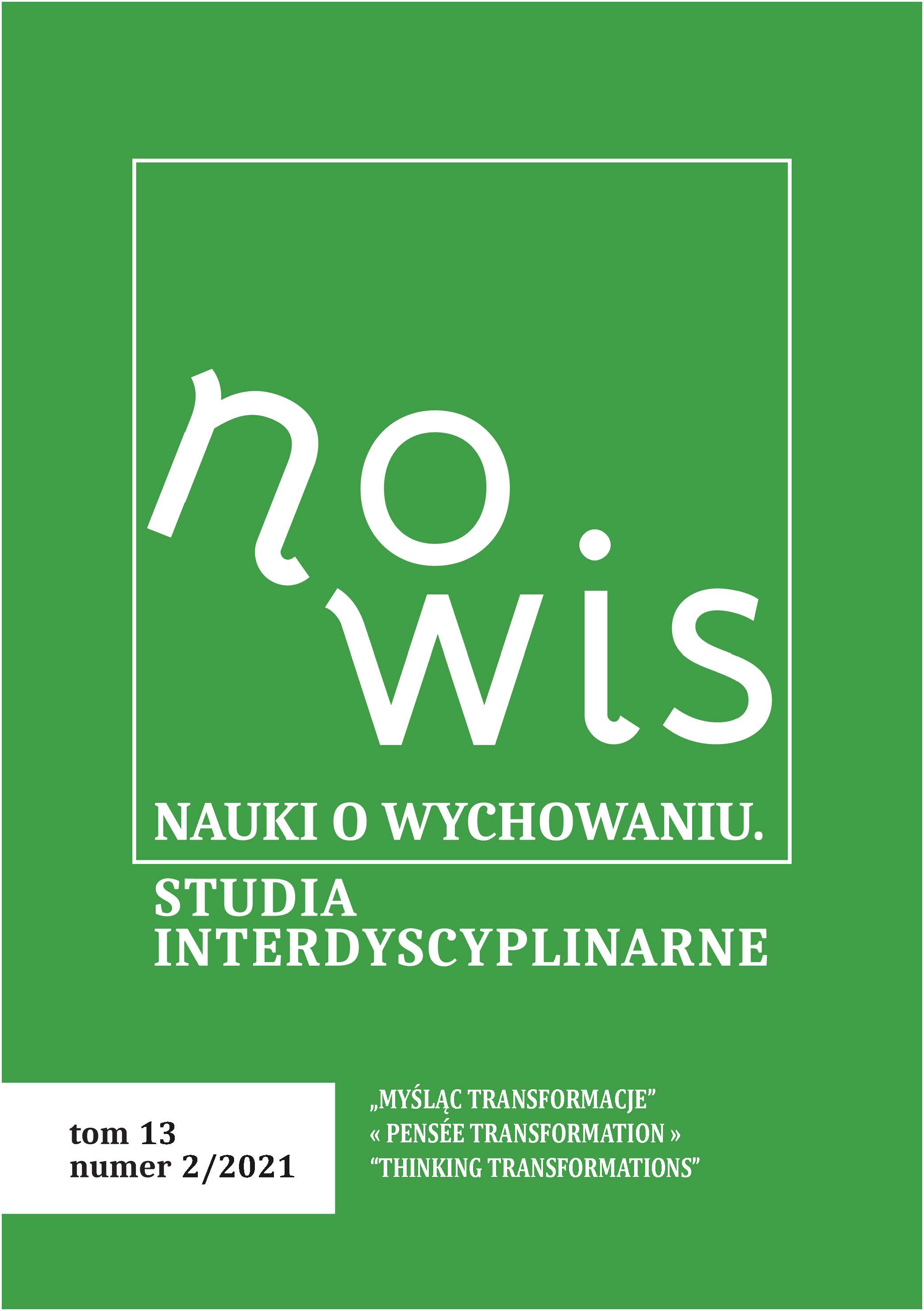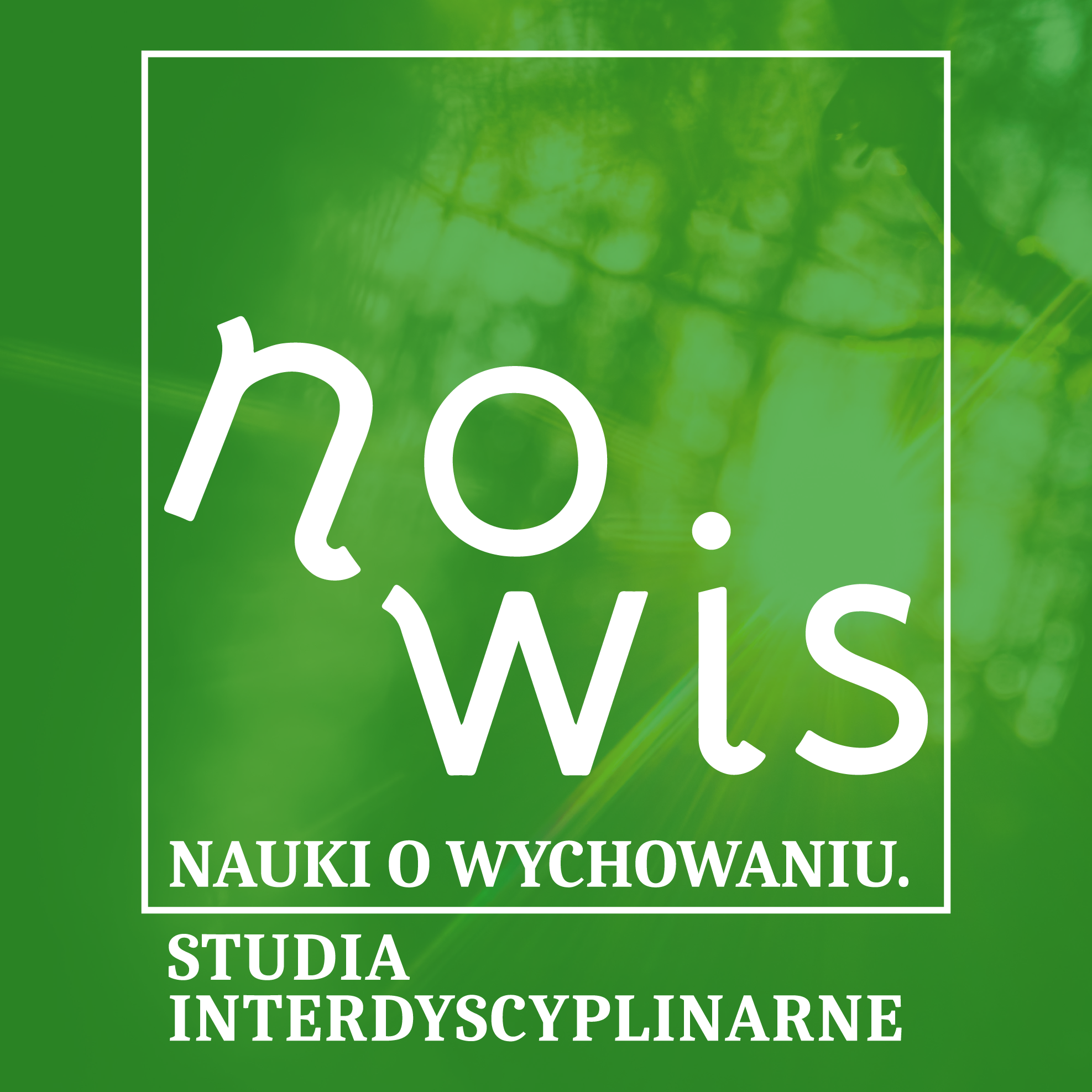Transwersalna analiza aktywności i paradygmat transformacji
DOI:
https://doi.org/10.18778/2450-4491.13.05Słowa kluczowe:
transversale analyse des activités, paradigme de la transformation, pédagogie sociale, raison transversaleAbstrakt
Treść tego artykułu pokazuje, w jaki sposób transwersalne podejście do analizy aktywności i paradygmat transformacji, obecne w twórczości Jeana-Marie Barbiera, przenikają perspektywę społeczno-pedagogiczną. Artykuł ujawnia także transformacje aktywności mentalnych w zderzeniu z nowymi konceptami. W tekście omówione są kolejno: – ramy epistemologiczne i metodologiczne podejścia transwersalnego oraz jego związki z paradygmatem transformacji; – koncepcja transwersalnej analizy aktywności oraz jej związki z transwersalnym paradygmatem transformacji w pedagogice społecznej. W odniesieniu do kluczowej koncepcji Wolfganga Welscha, „rozumu transwersalnego”, analizowana jest kategoria transwersalności. Podkreśla się znaczące cechy rozumu transwersalnego: napięcia i transformacje, co powoduje, że jego obraz jest hybrydalny i paradoksalny: wywołuje napięcia, ale i istnieje dzięki nim. W rezultacie wprowadza się w tekście kolejną kategorię: „proces transkulturowości”, który sprzyja konstruowaniu wymiaru transwersalnego i poznaniu mechanizmów transformacji. Z tego powodu ta kategoria wydaje się być atrakcyjna dla odkrycia złożoności paradygmatu : „myśląc transformacje” (pensée transformation). Ramy epistemologiczne i metodologiczne procesu transformacji aktywności opisują trzy kategorie: „długie trwanie” (longue durée), „zerwanie” (rupture), nieciągłość (discontinuité), wzbogacone o związki trwania i zmiany; złożoności, dwoistości i powiązań wzajemnych (liens conjoints). Na ich tle i w odniesieniu do nich omawiana jest koncepcja transwersalnej analizy aktywności, opracowana przez Jeana-Marie Barbiera. Stanowi to naturalne przejście do omówienia cech charakterystycznych transwersalnego paradygmatu transformacji, obecnego w pedagogice społecznej. W zakończeniu tekstu dominuje teza o ewolucyjnym i zmiennym wymiarze myślenia o transformacjach. Charakterystyczne są zerwania paradygmatyczne, także personalne i instytucjonalne, jednak dominująca w każdym procesie transformacji nieciągłość (discontinuité) stanowi „rezerwuar trwania”, dzięki któremu idee istnieją i mogą odnawiać się. Stanowisko to zawarte na zakończenie tego artykułu określa też epistemologiczny wymiar transwersalnego paradygmatu transformacji, omawianego ze społeczno-pedagogicznego punktu widzenia.
Bibliografia
Bachelard G. (2002 [1938]) Kształtowanie umysłu naukowego. Przyczynek do psychoanalizy wiedzy obiektywnej, trad. D. Leszczyński, Gdańsk, Słowo/obraz terytoria.
Google Scholar
Barbier J.-M. (2006) Działanie w kształceniu i pracy socjalnej. Analiza podejść, trad. G. Karbowska, Katowice, Wydawnictwo Naukowe „Śląsk”, coll. BPS.
Google Scholar
Barbier J.-M. (2016) Leksykon analizy aktywności. Konceptualizacje zwyczajowych pojęć, trad. et élaboration E. Marynowicz-Hetka, Łódź, Wydawnictwo Uniwersytetu Łódzkiego.
Google Scholar
Barbier J.-M. (2017) Vocabulaire d’analyse de l’activité, Penser les conceptualisations ordinaires, 2e édition revue et augmentée, Paris, Presses Universitaire de France.
Google Scholar
Barbier J.-M. (2018) Penser en termes de transformation in : J.-M. Barbier, M. Durand (coord.), avec la collaboration de C. Cohen, M.-L. Vitali, Représenter/transformer. Débats en analyse des activités, Paris, L’Harmattan : 11–23.
Google Scholar
Barbier J.-M. (2020) La transformation continue par les sujet des rapports qu᾽ils établissent avec/entre les composantes de leur activité in : Comprendre/transformer Débats en éducation et Formation, J. Thievenaz, J.-M. Barbier, F. Saussez (dir.), Bern, Berlin, Bruxelles, New York, Oxford, Warszawa, Peter Lang : 9–17.
Google Scholar
Barbier J.-M., Durand M. (2003) L’activité : un objet intégrateur pour les sciences sociales ? « Recherche & Formation », n° 42, L’analyse de l’activité. Approches situées, J.-M. Barbier, M. Durand (dir.) : 99–117, https://doi.org/10.3406/refor.2003.1831
Google Scholar
DOI: https://doi.org/10.3406/refor.2003.1831
Barbier J.-M., Galatanu O. (2006) Jednostkowość działania: kilka narzędzi analizy in : J.-M. Barbier, Działanie w kształceniu i pracy socjalnej. Analiza podejść, trad. G. Karbowska, Katowice, Wydawnictwo Naukowe „Śląsk”, coll. BPS : 145–174.
Google Scholar
Braudel F. (1949) La Méditerranée et le monde méditerranéen à l’époque de Philippe II, Paris, Armand Colin.
Google Scholar
Braudel F. (1997 [1958]) Les Écrits de Fernand Braudel, vol. 2 : Les Ambitions de l’histoire, Paris, De Fallois.
Google Scholar
Braudel F. (1999 [1971]) Historia i trwanie, trad. B. Geremek, W. Kula, Warszawa, Czytelnik.
Google Scholar
Dewey J. (1968 [1947]) Expérience et éducation, trad. M. A. Carroi, Paris, Librairie Armand Colin.
Google Scholar
Foucart J. (2016) Fluidité sociale et conceptualisations de l’entre-deux. Systèmes semichaotiques, réseaux et transactions sociales, Essai, Aix en Provence, Les éditions Persée.
Google Scholar
Jullien F. (2009) Les transformations silencieuses, Paris, Éditions Grasset et Fasquelle.
Google Scholar
Jullien F. (2017) Une seconde vie. Commencer véritablement d’exister, Paris, Éditions Grasset.
Google Scholar
Leszczyński D. (2002) Filozofia nauki Gastona Bachelarda in : G. Bachelard, Kształtowanie umysłu naukowego, trad. D. Leszczyński, Gdańsk, Słowo/obraz terytoria : 328–377.
Google Scholar
Kubicki R. (1998) O skoku do Królestwa Rozumu Transwersalnego in : Filozoficzne konteksty rozumu transwersalnego. Wokół koncepcji Wolfganga Welscha, deuxième partie, R. Kubicki (dir.), Poznań, Wydawnictwo Fundacji Humaniora : 161–168.
Google Scholar
Marynowicz-Hetka E. (2006) Pedagogika społeczna. Podręcznik akademicki. Wykład, vol. 1, Warszawa, Wydawnictwo Naukowe PWN.
Google Scholar
Marynowicz-Hetka E. (2008) Towards the transversalism of social pedagogy, trans. B. Przybylska in : Reframing the Social. Social Work and Social Policy in Europe/Reframing des Sozialen. Soziale Arbeit und Sozialpolitik in Europe/Reframing del Sociale. Lavoro Sociale e Politica Sociale nell’Europa, F. W. Seibel, H.-U. Otto, G. F. Friesenhahn (Hrsg.), Boskovice 2008, Albert : 85–102.
Google Scholar
Marynowicz-Hetka E. (2016) Konceptualizacje zwyczajowych ram myślenia o aktywności-na marginesie pracy nad tekstem in : J.-M. Barbier, Leksykon analizy aktywności. Konceptualizacje zwyczajowych pojęć, trad. et élaboration E. Marynowicz-Hetka, Wydawnictwo Uniwersytetu Łódzkiego : 271–289.
Google Scholar
Marynowicz-Hetka E. (2019) Pedagogika społeczna. Pojmowanie aktywności w polu praktyki, Łódź 2019, Wydawnictwo Uniwersytetu Łódzkiego.
Google Scholar
Marynowicz-Hetka E. (2020) Social Pedagogy. Comprehending activity in the field practice, trad. M. Hinton, Beau Bassin, Lambert Academic Publising.
Google Scholar
Marynowicz-Hetka E., Laot F. F. (2018) Éducation des adultes et progrès social selon Helena Radlińska in : Pionnières de l’éducation des adultes. Perspectives internationales, F. F. Laot, C. Solar (dir.), Paris, L’Harmattan : 163–182.
Google Scholar
Radlińska H. (1935) Stosunek wychowawcy do środowiska społecznego. Szkice z pedagogiki społecznej, Warszawa, Nasza Księgarnia.
Google Scholar
Skarga B. (2009) Tercet metafizyczny, Kraków, Wydawnictwo Znak.
Google Scholar
Theiss W. (1984) Helena Radlińska, Warszawa, Wydawnictwo „Żak”.
Google Scholar
Welsch W. (1998a) Transkulturowość. Nowa koncepcja kultury in : Filozoficzne konteksty koncepcji rozumu transwersalnego. Wokół koncepcji Wolfganga Welscha, trad. B. Susła, J. Wietecki, R. Kubicki (dir.), Poznań, Wydawnictwo Fundacji Humaniora : 195–222.
Google Scholar
Welsch W. (1998b) Wielość a niezróżnicowanie in : Filozoficzne konteksty koncepcji rozumu transwersalnego. Wokół koncepcji Wolgana Welscha, trad. B. Susła, J. Wietecki, R. Kubicki (dir.), Poznań, Wydawnictwo Fundacji Humaniora : 97–100.
Google Scholar
Welsch W. (2015) L’esthétique de Schiller reconsidérée. « La Beauté est liberté dans le phénomène » ou l’esthétique comme enjeu pour pensée moderne, trad. L. Marcucci, « Nouvelle revue d’esthétique », n° 15 : 83–92, https://doi.org/10.3917/nre.015.0083
Google Scholar
DOI: https://doi.org/10.3917/nre.015.0083
Witkowski L. (2013) Przełom dwoistości w pedagogice polskiej. Historia, teoria, krytyka, Kraków, Oficyna Wydawnicza „Impuls”.
Google Scholar
Witkowski L. (2014) Niewidzialne środowisko. Pedagogika kompletna Heleny Radlińskiej jako krytyczna ekologia idei, umysłu i wychowania. O miejscu pedagogiki w przełomie dwoistości w humanistyce, Kraków, Oficyna Wydawnicza „Impuls”.
Google Scholar
Bachelard G. (1967 [1934]) La formation de ľesprit scientifique. Contribution à une psychanalyse de la connaissance objective, 5e édition, Paris, Librairie philosophique J. VRIN, Coll. Bibliothèque des textes philosophiques, http://dx.doi.org/doi:10.1522/030331552 [consulté : 19.01.2021].
Google Scholar
DOI: https://doi.org/10.1522/030331552
Barbier J.-M. (2018a) Expérience, transformation de soi, construction du moi, affirmation du je, “The Conversation FR”, http://theconversation.com/experiencetransformation-de-soi-construction-du-moi-affirmation-du-je-88935 [consulté : 10.01.2018].
Google Scholar
Barbier J.-M., Dutoit M. (2021) Apprendre : Être plus grand dans sa tête, https://www.innovation-pedagogique.fr/article8610.html [consulté : 13.01.2021].
Google Scholar
Pobrania
Opublikowane
Jak cytować
Numer
Dział
Licencja

Utwór dostępny jest na licencji Creative Commons Uznanie autorstwa – Użycie niekomercyjne – Bez utworów zależnych 4.0 Międzynarodowe.





 Strona czasopisma, prowadzona przez Zespół redakcyjny NOWiS na platformie Index Copernicus:
Strona czasopisma, prowadzona przez Zespół redakcyjny NOWiS na platformie Index Copernicus: 





